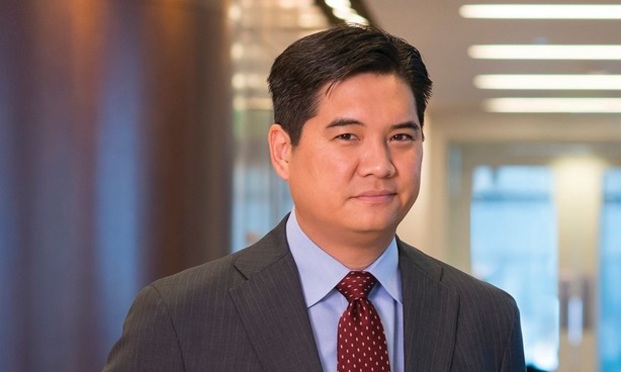Orrick Gets $62M Award Tossed in Long-Running Case
Christopher Adams alleged that former investment partners transferred assets to new companies while cutting him out. But he wasn't the right person to testify about the new companies' valuations, the Second District held.
December 31, 2019 at 04:56 PM
4 minute read
 MIchael Tu of Orrick, Herrington & Sutcliffe (courtesy photo)
MIchael Tu of Orrick, Herrington & Sutcliffe (courtesy photo)Christopher Adams has had two chances to prove that former investment partners owe him $62 million. Thanks to Orrick, Herrington & Sutcliffe, he isn't going to get a third.
California's Second District Court of Appeal threw out the $62 million award Tuesday, despite Adams' two opponents having been precluded at trial from contesting his valuation of a company the three created nearly 20 years ago. It's the second time the appellate court has thrown out a one-sided trial win for Adams against co-investors Hong Mu and David Topolewski.
"We find ourselves, once again, in the position of striking portions of a judgment against Topolewski and Mu notwithstanding their failure to participate appropriately in this litigation," Justice Lee Smalley Edmon wrote in a 27-page unpublished opinion. "Nonetheless, the evidentiary sanctions against Topolewski and Mu did not relieve Adams of his burden of proof, including his obligation to support his claims with admissible, reliable evidence."
An Orrick team led by partner Michael Tu joined the litigation after the second trial and argued the appeal along with Jeffrey Zuber of Zuber Lawler & Del Duca. Tu represented companies that Adams had characterized as successor entities, but the companies had never been added as defendants in the litigation. The appellate court said it had "significant concerns" about due process afforded those companies, but ultimately rested its decision on Adams' valuation model, which it called "wholly without foundation."
Adams was a co-investor with Mu and Topolewski in a business venture involving English language education technology in China. Adams received a 19.7% stake in companies called EXI and EXPL. Mu and Topolewski chose not to participate in a first trial, at which Adams valued his interest in EXPL at $62.7 million. The Second District threw out that result on the ground that Adams' expert witness had used a price-earnings model that's inappropriate for valuing closely held private companies.
"It is virtually impossible to determine the value of Adams's 19.7% interest in EXPL and related entities without financial data" allegedly held by Mu and Topolewski, the court stated then. Though it "seems inequitable" that Mu and Topolewski should benefit by failing to cooperate, the court ordered a second trial.
This time Mu and Topolewski participated, but "engaged in gross misuse of the discovery process," according to Los Angeles Superior Court Judge Michelle Rosenblatt. As a sanction, Rosenblatt forbade the defendants from presenting any valuation evidence.
Meanwhile, EXPL had been placed in receivership in 2010, and Adams alleged that Mu and Topolewski transferred its assets to Cirrus Education, a company that sells educational software to schools and hotels. Adams testified that another EXPL investor told him that Mu and Topolewski intended "just to change the name of the company" so that Adams could never collect his share.
Mu and Topolewski tried to testify that EXPL was properly foreclosed and that there was no continued relationship, but Superior Court Judge David Sotelo, who took over the case from the now-retired Rosenblatt, ruled that testimony precluded by Rosenblatt's sanctions order.
Instead of calling an expert witness this time, Adams testified himself that Cirrus and its related entities were worth about $306 million, making his 19.7% interest worth about $60 million. Sotelo found that Adams was qualified to give that opinion "as an owner entitled to possess the property he has been denied so many years and as a long-time business person and investor."
In reversing, the Second District ruled that Adams did not have "the requisite knowledge, skill, experience, training, or education to qualify as a valuation expert" on closely held companies, Edmon wrote. While an owner of a company may testify about valuation, "this principle does not apply in the present case because plaintiff unquestionably was not an owner of any of the New Companies."
Plus, "Adams's valuation method appears to closely resemble that used by his expert in the first trial of this matter, which we have already rejected as unsound," Edmon wrote.
The appellate court left intact other portions of the judgment against Mu and Topolewski, which may be worth about $500,000. But the court threw out the $62 million award and ordered no retrial, saying Adams had a full and fair opportunity to present the case.
Adams was represented by Baker, Keener & Nahra.
This content has been archived. It is available through our partners, LexisNexis® and Bloomberg Law.
To view this content, please continue to their sites.
Not a Lexis Subscriber?
Subscribe Now
Not a Bloomberg Law Subscriber?
Subscribe Now
NOT FOR REPRINT
© 2025 ALM Global, LLC, All Rights Reserved. Request academic re-use from www.copyright.com. All other uses, submit a request to [email protected]. For more information visit Asset & Logo Licensing.
You Might Like
View All
LSAT Administrator Sues to Block AI Tutor From Using ‘Famous, Distinctive’ Test Prep Materials
3 minute read
Some Elite Universities Favor Wealthy Students in Admissions Decisions, Lawsuit Alleges
5 minute read
How Uncertainty in College Athletics Compensation Could Drive Lawsuits in 2025
Law Firms Mentioned
Trending Stories
- 1'It's Not Going to Be Pretty': PayPal, Capital One Face Novel Class Actions Over 'Poaching' Commissions Owed Influencers
- 211th Circuit Rejects Trump's Emergency Request as DOJ Prepares to Release Special Counsel's Final Report
- 3Supreme Court Takes Up Challenge to ACA Task Force
- 4'Tragedy of Unspeakable Proportions:' Could Edison, DWP, Face Lawsuits Over LA Wildfires?
- 5Meta Pulls Plug on DEI Programs
Who Got The Work
Michael G. Bongiorno, Andrew Scott Dulberg and Elizabeth E. Driscoll from Wilmer Cutler Pickering Hale and Dorr have stepped in to represent Symbotic Inc., an A.I.-enabled technology platform that focuses on increasing supply chain efficiency, and other defendants in a pending shareholder derivative lawsuit. The case, filed Oct. 2 in Massachusetts District Court by the Brown Law Firm on behalf of Stephen Austen, accuses certain officers and directors of misleading investors in regard to Symbotic's potential for margin growth by failing to disclose that the company was not equipped to timely deploy its systems or manage expenses through project delays. The case, assigned to U.S. District Judge Nathaniel M. Gorton, is 1:24-cv-12522, Austen v. Cohen et al.
Who Got The Work
Edmund Polubinski and Marie Killmond of Davis Polk & Wardwell have entered appearances for data platform software development company MongoDB and other defendants in a pending shareholder derivative lawsuit. The action, filed Oct. 7 in New York Southern District Court by the Brown Law Firm, accuses the company's directors and/or officers of falsely expressing confidence in the company’s restructuring of its sales incentive plan and downplaying the severity of decreases in its upfront commitments. The case is 1:24-cv-07594, Roy v. Ittycheria et al.
Who Got The Work
Amy O. Bruchs and Kurt F. Ellison of Michael Best & Friedrich have entered appearances for Epic Systems Corp. in a pending employment discrimination lawsuit. The suit was filed Sept. 7 in Wisconsin Western District Court by Levine Eisberner LLC and Siri & Glimstad on behalf of a project manager who claims that he was wrongfully terminated after applying for a religious exemption to the defendant's COVID-19 vaccine mandate. The case, assigned to U.S. Magistrate Judge Anita Marie Boor, is 3:24-cv-00630, Secker, Nathan v. Epic Systems Corporation.
Who Got The Work
David X. Sullivan, Thomas J. Finn and Gregory A. Hall from McCarter & English have entered appearances for Sunrun Installation Services in a pending civil rights lawsuit. The complaint was filed Sept. 4 in Connecticut District Court by attorney Robert M. Berke on behalf of former employee George Edward Steins, who was arrested and charged with employing an unregistered home improvement salesperson. The complaint alleges that had Sunrun informed the Connecticut Department of Consumer Protection that the plaintiff's employment had ended in 2017 and that he no longer held Sunrun's home improvement contractor license, he would not have been hit with charges, which were dismissed in May 2024. The case, assigned to U.S. District Judge Jeffrey A. Meyer, is 3:24-cv-01423, Steins v. Sunrun, Inc. et al.
Who Got The Work
Greenberg Traurig shareholder Joshua L. Raskin has entered an appearance for boohoo.com UK Ltd. in a pending patent infringement lawsuit. The suit, filed Sept. 3 in Texas Eastern District Court by Rozier Hardt McDonough on behalf of Alto Dynamics, asserts five patents related to an online shopping platform. The case, assigned to U.S. District Judge Rodney Gilstrap, is 2:24-cv-00719, Alto Dynamics, LLC v. boohoo.com UK Limited.
Featured Firms
Law Offices of Gary Martin Hays & Associates, P.C.
(470) 294-1674
Law Offices of Mark E. Salomone
(857) 444-6468
Smith & Hassler
(713) 739-1250







